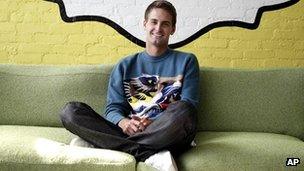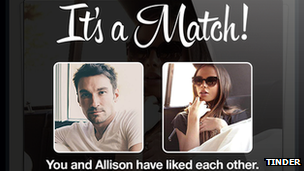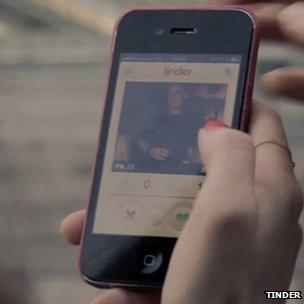Tinder 'hook-up' app ‘solves a problem for humanity’
- Published
Hook-up app Tinder is ‘solving a problem for humanity’ its maker says, but some of its users are not so sure
"No. No. No. No. Definitely not. No. No. No. Oh… hello..."
The unmistakable sound there of someone using Tinder, the online dating app that has got millions talking and - in their droves - apparently jumping into bed with each other.
For the uninitiated, here we go: you see a picture of a potential match, along with their age, and a couple of shared interests based on the information you've publicly shared on Facebook.
If you share the same friends, it'll tell you that too.
If you don't like the look of someone, you swipe left, and they're gone.
But if you do fancy a bit of what you see, swipe right.
Mutual swipe-rights are informed of their match and are then, and only then, given the ability to contact each other.
And from there, a path to true love, right?
Hook-up culture
Well maybe, actually.
"We've created over 150 marriages that we know about," says Sean Rad, Tinder's co-founder.
"Every day we get hundreds and thousands of emails telling us either [about] friendships made on Tinder or engagements, or long-term relationships being created."
It's a charming track record, but the story here is that Tinder has emerged as something of a market leader in a growing culture of "hook-up" apps, designed to find partners, quickly, with minimum effort.
On an internet traditionally populated by dating sites that demand the meticulous creation of sugar-coated profiles, "swipe-right" is seen by some as a refreshing change of approach.
"The technology is leaping ahead; I think the industry is dividing a lot," says Susan Quilliam, a relationship coach who runs classes in effective online dating.
Ms Quilliam has been offering advice to online daters for a number of years. Now she feels the game is beginning to change.
"I think the way the market will develop will be to segment into needs. One of those needs will be sex, one will be relationships, another will be for having affairs…"
There are others in the hook-up space , such as the delicately-named Bang With Friends - although it had to change its name to Down - that all utilise two relatively recent technological developments: location awareness - so an app knows where you are - and social networking data - algorithms that can be crunched to offer matches based on what you've already put out there online.
Think of it as engineered serendipity - but be prepared for the unhappiness if nothing comes your way. Tinder, Ms Quilliam says, can be fickle.
"If you go through three weeks filing through and you don't get anything back, how good are you going to feel?
"Don't get disillusioned. Don't take it to heart. There's an awful lot of people out there."
Humanity
The BBC met the 27-year-old Mr Rad - who doesn't like to describe Tinder as a dating app - at an upmarket hotel in Berlin, where he had been invited to talk at a conference.
His entourage, to oversell it just a little, consisted of his girlfriend, who naturally he met on Tinder, and his parents - who jokingly suggested a more interesting interview would be with them, discussing how proud they were of their son's achievements.
And with good reason.
Mr Rad wouldn't share the site's total user base - these start-up types rarely do - but he would say that every day, 450 million Tinder profiles are being viewed.
The total size of the network, whatever it is, is growing by 15% a week.
This excited chatter around Tinder has made it one of the hottest companies in the start-up scene.
It is based in Los Angeles - not Silicon Valley - and Mr Rad and team hang out with the other social networking darling-of-the-moment, Snapchat.
Like many successful ideas, Tinder was created because it was something its makers needed themselves.

Tinder is based in Los Angeles, also the home of other app-of-the-moment, Snapchat
"It was a general problem that I had meeting new people," Mr Rad admits.
"One thing we hear all the time, particularly from women on Tinder, is that in the real world when somebody approaches them - they could be the most interesting guy in the room - they feel like their personal space has been bombarded, and they feel overwhelmed.
"As a result, the people who are the pursuers sit back and decide to be introverts and not really pursue that relationship."
Mr Rad was one such introvert , and it's this mission that provokes him into one of the loftier remarks regarding his work.
"Our goal is to build a meaningful, large, standalone company that solves this problem for humanity," he says.
Real world
All well and good, of course, but a company with 27 employees and a huge and expectant userbase can't survive on enthusiasm alone.
Tinder is financially backed by IAC, the firm that has match.com and OkCupid, among other dating-orientated sites, on its books.
While still in the bums-on-seats phase of start-up growth, Tinder will sooner or later need to look to monetise its app.
One suggestion, Mr Rad hinted to technology news site Techcrunch, external, would be to charge people to back swipe, in case they accidentally dismissed someone they did in fact like, unintentionally banishing them away for ever.

What you want to see - Tinder lets you communicate, but only after mutual interest
But before it gets to that point, Mr Rad has other operational challenges to deal with.
Reports earlier in the year highlighted concerns over the amount of data Tinder is logging about its users, particularly location.
Like any popular service, scammers are starting to take notice - bots purporting to be beautiful people, mostly women, are spreading with the intent to trick unsuspecting users into all sorts of unfortunate lapses, mainly giving over personal data.
And the close ties with Facebook have made some wary that Tinder, more so than other dating sites, makes it easier to track people down - a worry Mr Rad dismisses.
"That person isn't getting any information that they could not potentially get by being the same room as you," he argues, "Or by finding you on the internet."
Profile fatigue
Tinder's success heralds the next wave of dating online.
It's one of profile fatigue, when people no longer have the time, nor see the point, to write reams on how they love travelling, go to festivals, and read very, very sophisticated books.
Technology can, and does, speed up the process of meeting potential partners - because now, more than ever, we need to date.
"The problem nowadays is that we have more dating windows," explains relationship coach Ms Quilliam, referring to the stages in life where we may look for a special someone - be it as a teenager, student, young professional, widower and so on.

The Tinder app lets users scroll through potential matches - and swipe right says "yes please!"
"A hundred years ago, you got married in your late teens, early 20s, and that was basically it.
"We're so busy and stressed so we don't get to meet people. We move location, we move jobs, we move towns.
"There are five times more dating windows when we need dates, but less opportunity than we've ever had."
Tinder and its competitors think they can go some way to address that problem, by at least getting people in similar circles to notice each other.
But if Sean Rad embodies the new school of thought when it comes to finding a partner, it's his girlfriend Alexa who reminds us of the non-digital skills we need too.
After Mr Rad's interview, she explained that the size of Tinder's Berlin entourage was largely down to her.
A surprise trip to Europe ; what better way to get the boyfriend's parents on side?
Follow Dave Lee on Twitter @DaveLeeBBC, external
- Published29 July 2013
- Published7 December 2011
- Published13 September 2011